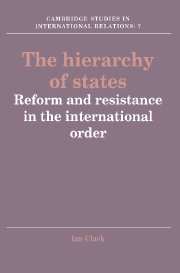Book contents
- Frontmatter
- Contents
- Preface
- Introduction: the ‘whig’ and ‘tory’ interpretations
- PART 1 THE IDEOLOGY OF INTERNATIONAL ORDER
- PART 2 THE PRACTICE OF INTERNATIONAL ORDER
- 5 Order and change in the international system, 1815–1990
- 6 From balance to concert, 1815–1854
- 7 Balance without concert, 1856–1914
- 8 Concert without balance, 1918–1939
- 9 From concert to balance, 1945–1990
- Conclusion
- Notes
- Bibliography
- Index
6 - From balance to concert, 1815–1854
Published online by Cambridge University Press: 21 September 2009
- Frontmatter
- Contents
- Preface
- Introduction: the ‘whig’ and ‘tory’ interpretations
- PART 1 THE IDEOLOGY OF INTERNATIONAL ORDER
- PART 2 THE PRACTICE OF INTERNATIONAL ORDER
- 5 Order and change in the international system, 1815–1990
- 6 From balance to concert, 1815–1854
- 7 Balance without concert, 1856–1914
- 8 Concert without balance, 1918–1939
- 9 From concert to balance, 1945–1990
- Conclusion
- Notes
- Bibliography
- Index
Summary
The interest of students of international relations in the congress system and in the Concert of Europe hinges on an attempt to see these diplomatic techniques in the broad perspective of their contribution to the theory and practice of international relations. That is to say that the questions that mainly concern us are the following: Was there such a thing as the Concert of Europe? Did it survive beyond the period of congress diplomacy in the few years after the 1815 settlement? Upon what principles if any was the Concert based? To what extent was the Concert a novel element in the history of international relations? What is required is an appreciation not only of the historical nature of the European Concert of the nineteenth century but also of the nature of a concert system as one amongst several systems for the management of international relations.
A proper understanding of the Concert is important, both in its own historical terms and because it poses wider questions of interest to the student of international relations. Central to these is the relationship between the Concert and the period of relative peace which prevailed in the first half of the nineteenth century. Was it the Concert which contributed to the maintenance of the stability in the international order which prevailed until the 1850s? Alternatively, was the Concert simply parasitic upon other conditions which made the Concert viable in the first place.
- Type
- Chapter
- Information
- The Hierarchy of StatesReform and Resistance in the International Order, pp. 112 - 130Publisher: Cambridge University PressPrint publication year: 1989
- 1
- Cited by



